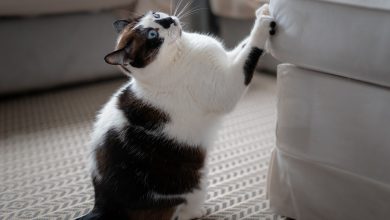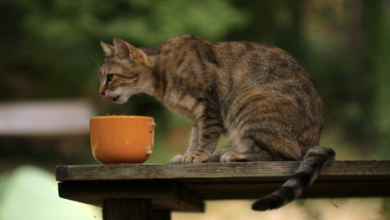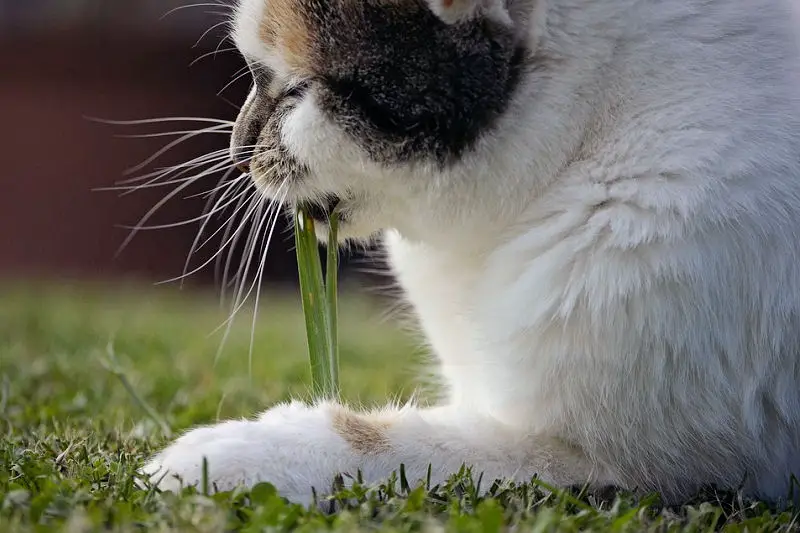
When thinking about a pet dining on a freshly dewed blade of grass, your mind will likely wander towards a dog chomping away at mostly indigestible weeds.
Cats, however, are no stranger to this behavior. If given the opportunity, your little kitty would have no reservations about making a reservation for one at the Crab Grass Cafe.

If you see your cat going for some sprouted stalks, do not be alarmed. This behavior has long been documented and is largely understood by animal experts.
Why Do Cats Eat Grass?
Felines have been around for a very long time, in some form or another. Your sweet little ball of nuzzles may be cute, but his ancestors were nothing to paw at. With razor sharp claws and bone crunching canines, felines ate quickly, often neglecting the time it took to ensure that the meat ingested was boneless. It is believed that these meat eaters occasionally turned to plant life to rid the body of unnecessary bones and body parts.
If your cat has ever ventured into the great outdoors, he has likely ingested grass. As a loving cat owner, it is natural to be concerned with this behavior – as it seems to divert from the notion that cats are obligate carnivores.
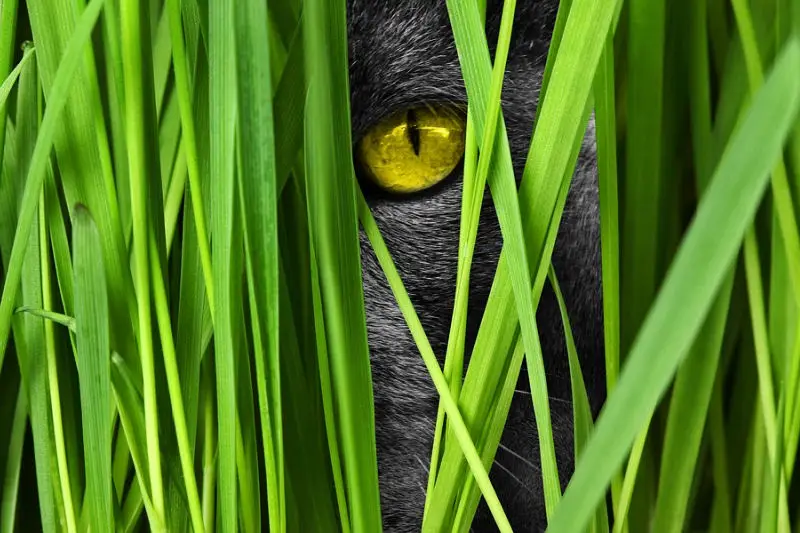
The behavior of your cat eating grass is typically followed by loud retching and, finally, a chlorofyll-filled ball of slime puked onto your favorite sweater.
Felines: The Obligate Carnivore
Felines are classified as obligate carnivores. What this means is that the overwhelming majority of their diet should be meat – and high quality meat at that. Any grain or vegetable product found in their cat food is essentially filler and could cause long-term harm to your kitty.
When thinking about what kind of food to give your cat, remember that wet food is the better way to go over a dry kibble, as their desire for thirst is not very strong and will benefit from the water content in the wet food. Do your research and keep the meat as unprocessed as possible.
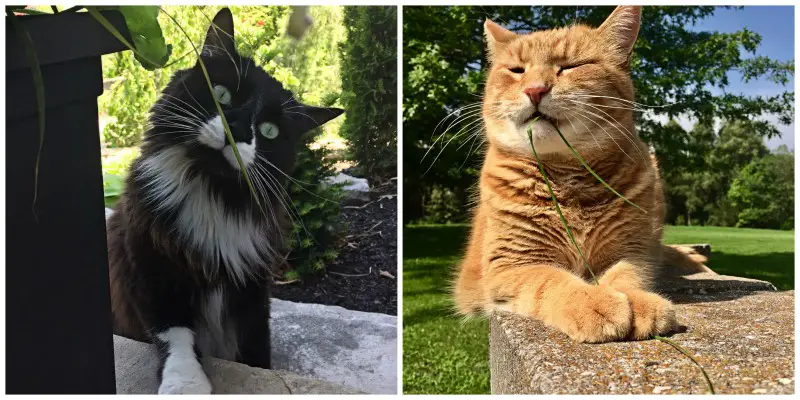
Photo above: Our own kitties (Newman and Mouse enjoying their daily ‘grass fix’)
Consuming a strictly-meat diet allows the kidneys to produce highly acidic urine. This high level of acidity makes bacteria growth incredibly difficult – helping to ensure your cat stays healthy.
[clickToTweet tweet=”Why Do Cats Eat Grass? The reason may surprise you!” quote=”Why Do Cats Eat Grass? The reason may surprise you!”]
When that high level of acidity (5.7-6.3 pH) is not met, stones can form within the bladder and bacterial crystals will begin to populate. This can severely inhibit your cat’s ability to properly urinate – especially if you’ve got a male fur-friend.
Left unchecked, a urethral plug could form, spelling trouble, surgery, and potential death.
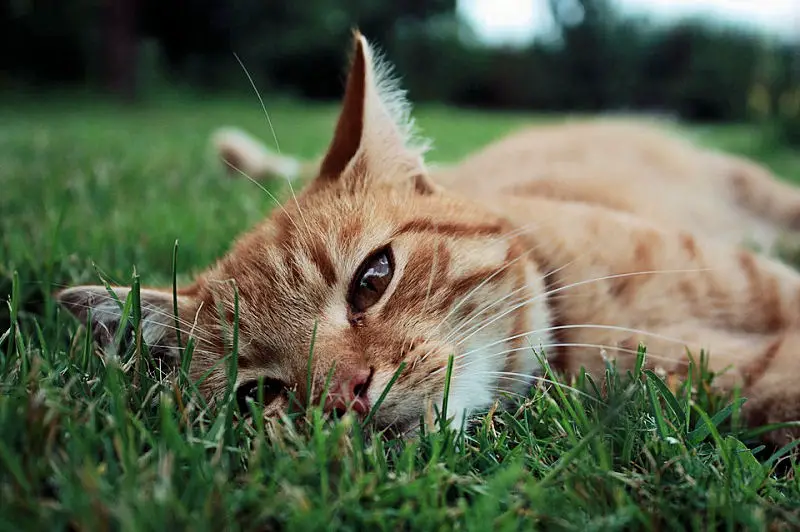
Contact your veterinarian if you notice your cat’s bathroom habits are off, he is straining when urinating, or that he is relieving himself outside of the litter box. While there are many beneficial urinary tract products out there, a medical professional’s advice should always be the first thing sought.
A cat’s GI tract is designed to efficiently process and digest the carcasses of the small game they typically hunt. There are parts of small game that a cat simply cannot digest or pass, such as bones, beaks, or feathers. When a feline finds himself unable to rid himself of the bird byproduct, they may turn to grass as a quick fix.
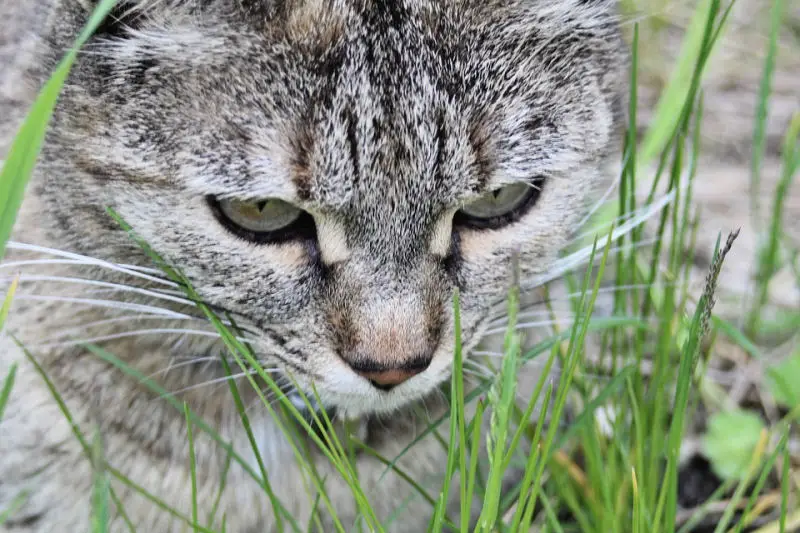
Grass: Leaving Indigestion Up In Smoke
Even if you’re feeding your cat the best raw-fed diet money can buy, curiosity in small indigestible household objects may have killed your cat’s pristine digestion.
If a cat’s digestion is out of whack or is log-jammed with blue-jay bones, his first instinct may point him to a lush clump of grass or perhaps your prize winning fern. Eating grass is purported to clear a feline’s digestive tract of indigestible matter, whether through puking or passing it into a clumpy greenish brown mess.
Clearing his digestive tract in this manner may be painful or uncomfortable, but it does have short term success in getting the gunk out.
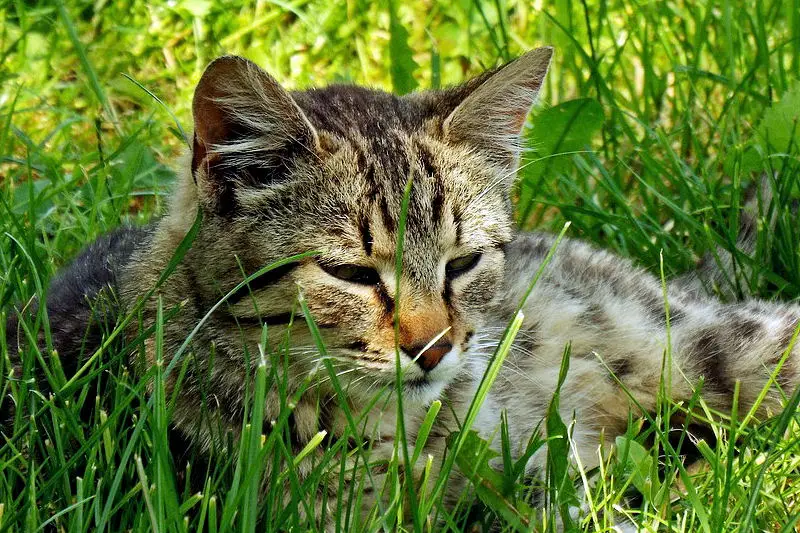
Human Grade Probiotics For Cats
A less painful solution to dealing with an out of whack GI tract is giving your fluffer human-grade probiotics for cats. Put simply, probiotics are beneficial bacteria that naturally occur within the gut. When the gut is not functioning properly, often times it is due to a bacterial imbalance. Giving your cat probiotics restore that healthy balance. Probiotics offer an all-natural long-term approach in maintaining proper digestion and healthy nutrient absorption. Look for a probiotic that includes prebiotics, digestive enzymes, and good fats, such as coconut oil.
With close to 70% of your cats immune system housed in the GI tract, a healthy GI tract and a healthy immune system are more related than some may think. Probiotics work to support these interconnected bodily functions. Outside of the GI tract and the immune system, probiotics help maintain proper oral health, and support healthy skin and coat.
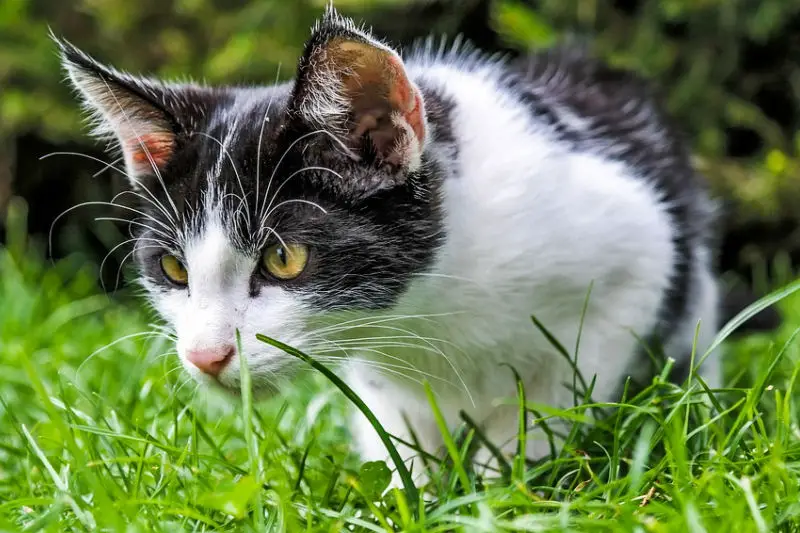
Beyond Digestion
While the vast majority of the nutrients felines receive comes from the meat ingested, it is believed that cats will occasionally bring certain nutrients in from plant matter. A key nutrient that cats need for maintaining certain biological functions is folate, or folic acid. Folic acid aids in the creation of hemoglobin, a vital protein responsible for oxygen within the blood. If your meowser has a lack of this essential nutrient, he may forage for it among the foliage.
If your cat has a penchant for munching on green goodness, consider maintaining an in-door grass garden. With the liberal use of pesticides on lawns and plants, eating a seemingly harmless blade of grass could turn toxic for your Tabby.
Credits: Article content contributed by our paw pals at Fidobiotics
If you enjoyed this article, you may also be interested in our post on Cat Allergies: Nothing to Sneeze At


